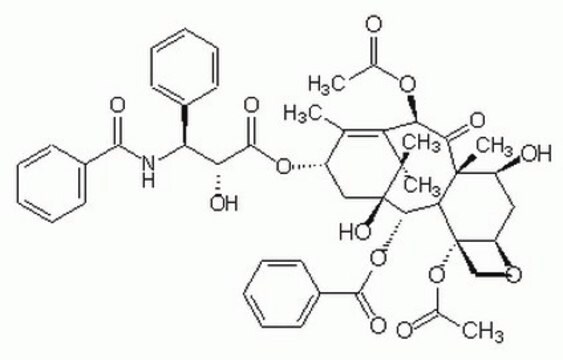About This Item
Recommended Products
biological source
semisynthetic
Assay
≥98%
impurities
natural taxane impurities, none detected (except ≤0.5% paclitaxel degradation products.)
mp
213 °C (dec.) (lit.)
solubility
DMSO: soluble 50 mg/mL
methanol: soluble 50 mg/mL, clear, colorless
H2O: soluble (hydrolyzes)
ethanol: soluble
antibiotic activity spectrum
neoplastics
Mode of action
DNA synthesis | interferes
originator
Bristol-Myers Squibb
storage temp.
−20°C
SMILES string
[H][C@@]12C[C@H](O)[C@@]3(C)C(=O)[C@H](OC(C)=O)C4=C(C)[C@H](C[C@@](O)([C@@H](OC(=O)c5ccccc5)[C@]3([H])[C@@]1(CO2)OC(C)=O)C4(C)C)OC(=O)[C@H](O)[C@@H](NC(=O)c6ccccc6)c7ccccc7
InChI
1S/C47H51NO14/c1-25-31(60-43(56)36(52)35(28-16-10-7-11-17-28)48-41(54)29-18-12-8-13-19-29)23-47(57)40(61-42(55)30-20-14-9-15-21-30)38-45(6,32(51)22-33-46(38,24-58-33)62-27(3)50)39(53)37(59-26(2)49)34(25)44(47,4)5/h7-21,31-33,35-38,40,51-52,57H,22-24H2,1-6H3,(H,48,54)/t31-,32-,33+,35-,36+,37+,38-,40-,45+,46-,47+/m0/s1
InChI key
RCINICONZNJXQF-MZXODVADSA-N
Gene Information
human ... BCL2(596) , TUBA1A(7846) , TUBA1B(10376) , TUBA1C(84790) , TUBA3C(7278) , TUBA3E(112714) , TUBA4A(7277) , TUBB(203068) , TUBB1(81027) , TUBB2A(7280) , TUBB2B(347733) , TUBB3(10381) , TUBB4A(10382) , TUBB4B(10383) , TUBB6(84617) , TUBB8(347688)
Looking for similar products? Visit Product Comparison Guide
General description
Application
Biochem/physiol Actions
Features and Benefits
Caution
Preparation Note
Signal Word
Danger
Hazard Statements
Precautionary Statements
Hazard Classifications
Muta. 2 - Repr. 1B - STOT RE 1
Target Organs
Central nervous system,Bone marrow,Cardio-vascular system
Storage Class Code
6.1C - Combustible acute toxic Cat.3 / toxic compounds or compounds which causing chronic effects
WGK
WGK 3
Flash Point(F)
Not applicable
Flash Point(C)
Not applicable
Personal Protective Equipment
Certificates of Analysis (COA)
Search for Certificates of Analysis (COA) by entering the products Lot/Batch Number. Lot and Batch Numbers can be found on a product’s label following the words ‘Lot’ or ‘Batch’.
Already Own This Product?
Find documentation for the products that you have recently purchased in the Document Library.
Customers Also Viewed
Articles
Discover Bioactive Small Molecules for ADME/Tox
Discover Bioactive Small Molecules for ADME/Tox
Discover Bioactive Small Molecules for ADME/Tox
Discover Bioactive Small Molecules for ADME/Tox
Related Content
Explore protein pathway analysis through chemical library screening, investigating protein interactions, and modulating signaling pathways with small molecules.
Explore protein pathway analysis through chemical library screening, investigating protein interactions, and modulating signaling pathways with small molecules.
Explore protein pathway analysis through chemical library screening, investigating protein interactions, and modulating signaling pathways with small molecules.
Explore protein pathway analysis through chemical library screening, investigating protein interactions, and modulating signaling pathways with small molecules.
Our team of scientists has experience in all areas of research including Life Science, Material Science, Chemical Synthesis, Chromatography, Analytical and many others.
Contact Technical Service









